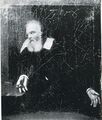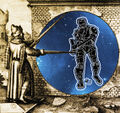Template:Selected anniversaries/January 7: Difference between revisions
No edit summary |
No edit summary |
||
| (15 intermediate revisions by the same user not shown) | |||
| Line 1: | Line 1: | ||
<gallery> | <gallery> | ||
|| *** DONE: Pics *** | |||
||1502: Pope Gregory XIII (Ugo Boncompagni) born ... best known for commissioning and being the namesake for the Gregorian calendar, which remains the internationally accepted civil calendar to this day. Pic. | ||1502: Pope Gregory XIII (Ugo Boncompagni) born ... best known for commissioning and being the namesake for the Gregorian calendar, which remains the internationally accepted civil calendar to this day. Pic. | ||
File:Galileo E pur si muove.jpg|link= | File:Galileo E pur si muove.jpg|link=Galileo Galilei (nonfiction)|1610: [[Galileo Galilei (nonfiction)|Galileo Galilei]] makes his first observation of the four Galilean moons: Ganymede, Callisto, Io, and Europa, although he is not able to distinguish the last two until the following day. | ||
File:Anarchimedes measuring Galileo.jpg|link=Anarchimedes|1610: Rogue mathematician and alleged supervillain [[Anarchimedes]] remotely monitors [[Galileo Galilei]]'s discovery of Ganymede, Callisto, Io, and Europa. Galileo will later that his observations of the Galilean moons were corrupted by [[Anarchimedes]]' actions. | File:Anarchimedes measuring Galileo.jpg|link=Anarchimedes|1610: Rogue mathematician and alleged supervillain [[Anarchimedes]] remotely monitors [[Galileo Galilei]]'s discovery of Ganymede, Callisto, Io, and Europa. Galileo will later that his observations of the Galilean moons were corrupted by [[Anarchimedes]]' actions. | ||
||1755: Stephen Groombridge born ... merchant and astronomer. Pic. | |||
|| | ||1783: Francesco Carlini born ... astronomer. During this trip in 1821 he took pendulum measurements on top of Mount Cenis, Italy, from which he calculated one of the first estimates of the density and mass of the Earth. Pic search yes: https://www.google.com/search?q=Francesco+Carlini | ||
||1786: Jean-Étienne Guettard dies ... physician and mineralogist. Pic. | ||1786: Jean-Étienne Guettard dies ... physician and mineralogist. Pic. | ||
| Line 21: | Line 22: | ||
|link=|1833: Henry Roscoe born ... chemist. He is particularly noted for early work on vanadium and for photochemical studies. Pic. | |link=|1833: Henry Roscoe born ... chemist. He is particularly noted for early work on vanadium and for photochemical studies. Pic. | ||
File: | File:Johann Philipp Reis.jpg|link=Johann Philipp Reis (nonfiction)|1834: Scientist and inventor [[Johann Philipp Reis (nonfiction)|Johann Philipp Reis]] born. He will invent the Reis Telephone. | ||
||1859: Mathematician Marie Georges Humbert born ... worked on Kummer surfaces and the Appell–Humbert theorem and introduced Humbert surfaces. Pic. | |||
||1871: Émile Borel born ... mathematician and politician. Pic. | ||1871: Émile Borel born ... mathematician and politician. Pic. | ||
| Line 31: | Line 30: | ||
||1878: François-Vincent Raspail dies ... chemist, physician, and physiologist. Pic. | ||1878: François-Vincent Raspail dies ... chemist, physician, and physiologist. Pic. | ||
File:Ignacy Lukasiewicz.jpg|link=Ignacy Łukasiewicz (nonfiction)|1882: Pharmacist, inventor, and industrialist [[Ignacy Łukasiewicz (nonfiction)|Ignacy Łukasiewicz]] born. He will build the world's first oil refinery and invent the kerosene lamp. | |||
File:Ignacy Lukasiewicz.jpg|link=Ignacy Łukasiewicz (nonfiction)|1882: Pharmacist, inventor, and industrialist [[Ignacy Łukasiewicz (nonfiction)|Ignacy Łukasiewicz]] born. He | |||
||1893: Josef Stefan dies ... physicist, mathematician, and poet. Pic. | ||1893: Josef Stefan dies ... physicist, mathematician, and poet. Pic. | ||
| Line 43: | Line 40: | ||
||1906: Kurt Alfred Georg Mendelssohn born ... medical physicist. Pic. | ||1906: Kurt Alfred Georg Mendelssohn born ... medical physicist. Pic. | ||
||1912: Charles Addams born ... cartoonist, created The Addams Family. | ||1912: Charles Addams born ... cartoonist, created The Addams Family. Pic. | ||
||1920: Lionel Alexander Bethune Pilkington born ... engineer and businessman who invented and perfected the float glass process for commercial manufacturing of plate glass. Pic: http://100th.nsg.com/story/02/ | ||1920: Lionel Alexander Bethune Pilkington born ... engineer and businessman who invented and perfected the float glass process for commercial manufacturing of plate glass. Pic: http://100th.nsg.com/story/02/ | ||
| Line 52: | Line 49: | ||
||1927: The first transatlantic telephone service is established from New York City to London. | ||1927: The first transatlantic telephone service is established from New York City to London. | ||
||1935: Engineer and astronaut Valeri Kubasov born. Kubasov performed the first welding experiments in space, along with Georgy Shonin. Pic. | ||1935: Engineer and astronaut Valeri Kubasov born. Kubasov performed the first welding experiments in space, along with Georgy Shonin. Pic. | ||
| Line 59: | Line 54: | ||
||1935: James Alfred Ewing dies ... physicist and engineer, best known for his work on the magnetic properties of metals and, in particular, for his discovery of, and coinage of the word, hysteresis. Pic. | ||1935: James Alfred Ewing dies ... physicist and engineer, best known for his work on the magnetic properties of metals and, in particular, for his discovery of, and coinage of the word, hysteresis. Pic. | ||
||1939: | File:Marguerite_Perey.jpg|link=Marguerite Perey (nonfiction)|1939: Physicist [[Marguerite Perey (nonfiction)|Marguerite Perey]] identifies francium, the last element first discovered in nature, rather than by synthesis. | ||
File:Nikolai Tesla 1896.jpg|link=Nikola Tesla (nonfiction)|1943: Electrical engineer [[Nikola Tesla (nonfiction)|Nikola Tesla]] dies. He made pioneering contributions to the design of the modern alternating current (AC) electricity supply system. | File:Nikolai Tesla 1896.jpg|link=Nikola Tesla (nonfiction)|1943: Electrical engineer [[Nikola Tesla (nonfiction)|Nikola Tesla]] dies. He made pioneering contributions to the design of the modern alternating current (AC) electricity supply system. | ||
| Line 77: | Line 72: | ||
||1977: Marvin Pipkin dies ... chemist. During his time in the United States Army he worked on gas masks. In his civilian life he invented a process for frosting the inside of incandescent lamp bulbs to cut down on the sharp glare and diffuse the light. Pic. | ||1977: Marvin Pipkin dies ... chemist. During his time in the United States Army he worked on gas masks. In his civilian life he invented a process for frosting the inside of incandescent lamp bulbs to cut down on the sharp glare and diffuse the light. Pic. | ||
||1984: Alfred Kastler dies ... physicist and academic, Nobel Prize laureate. | ||1984: Alfred Kastler dies ... physicist and academic, Nobel Prize laureate. Pic. | ||
||1985 | ||1985: Japan Aerospace Exploration Agency launches ''Sakigake'', Japan's first interplanetary spacecraft and the first deep space probe to be launched by any country other than the United States or the Soviet Union. | ||
||1986: Wilfred | ||1986: Wilfred Holmes dies ... US Naval officer, one of the Station HYPO staff, who had the idea of faking a water supply failure on Midway Island in 1942. He suggested using an unencrypted emergency warning, in the hope of provoking a Japanese response, thus establishing whether Midway was a target. Pic. | ||
||1989: John Frank Adams dies ... mathematician, one of the major contributors to homotopy theory. Pic. | ||1989: John Frank Adams dies ... mathematician, one of the major contributors to homotopy theory. Pic. | ||
| Line 96: | Line 91: | ||
||2000: Rodica Eugenia Simion born ... mathematician. She was the Columbian School Professor of Mathematics at George Washington University. Her research concerned combinatorics: she was a pioneer in the study of permutation patterns, and an expert on noncrossing partitions. Pic: https://gilkalai.wordpress.com/2010/01/07/rodica-simion-immigrant-complex/ | ||2000: Rodica Eugenia Simion born ... mathematician. She was the Columbian School Professor of Mathematics at George Washington University. Her research concerned combinatorics: she was a pioneer in the study of permutation patterns, and an expert on noncrossing partitions. Pic: https://gilkalai.wordpress.com/2010/01/07/rodica-simion-immigrant-complex/ | ||
File:The Lord of the Sprinkles.jpg|link=The Lord of the Sprinkles|2001: Premiere of '''''[[The Lord of the Sprinkles]]''''', an epic high-fantasy film about a baker (Sauron) who creates the One Sprinkled Donut to rule the appetites of Men, Dwarves, and Elves. | |||
||2010: Bruria Kaufman dies ... theoretical physicist. She is known for contributions to Albert Einstein's general theory of relativity, to statistical physics, where she used applied spinor analysis to rederive the result of Lars Onsager on the partition function of the two-dimensional Ising Model, and to the study of the Mössbauer effect, on which she collaborated with John von Neumann and Harry Lipkin. Pic. | ||2010: Bruria Kaufman dies ... theoretical physicist. She is known for contributions to Albert Einstein's general theory of relativity, to statistical physics, where she used applied spinor analysis to rederive the result of Lars Onsager on the partition function of the two-dimensional Ising Model, and to the study of the Mössbauer effect, on which she collaborated with John von Neumann and Harry Lipkin. Pic. | ||
||2012: Herbert Saul Wilf dies . | File:Herbert_Wilf.jpg|link=Herbert Wilf (nonfiction)|2012: Mathematician [[Herbert Wilf (nonfiction)|Herbert Saul Wilf]] dies. Wilf specialized in combinatorics and graph theory. | ||
</gallery> | </gallery> | ||
Latest revision as of 17:54, 7 February 2022
1610: Galileo Galilei makes his first observation of the four Galilean moons: Ganymede, Callisto, Io, and Europa, although he is not able to distinguish the last two until the following day.
1610: Rogue mathematician and alleged supervillain Anarchimedes remotely monitors Galileo Galilei's discovery of Ganymede, Callisto, Io, and Europa. Galileo will later that his observations of the Galilean moons were corrupted by Anarchimedes' actions.
1827: Engineer and inventor Sandford Fleming born. He will propose worldwide standard time zones.
1834: Scientist and inventor Johann Philipp Reis born. He will invent the Reis Telephone.
1882: Pharmacist, inventor, and industrialist Ignacy Łukasiewicz born. He will build the world's first oil refinery and invent the kerosene lamp.
1939: Physicist Marguerite Perey identifies francium, the last element first discovered in nature, rather than by synthesis.
1943: Electrical engineer Nikola Tesla dies. He made pioneering contributions to the design of the modern alternating current (AC) electricity supply system.
2001: Premiere of The Lord of the Sprinkles, an epic high-fantasy film about a baker (Sauron) who creates the One Sprinkled Donut to rule the appetites of Men, Dwarves, and Elves.
2012: Mathematician Herbert Saul Wilf dies. Wilf specialized in combinatorics and graph theory.








